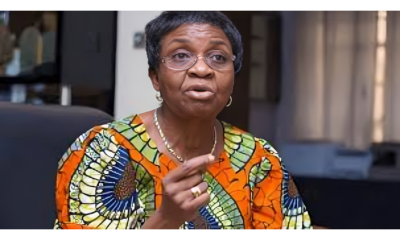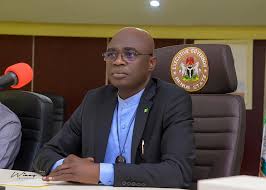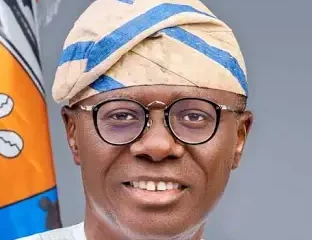FEATURES
Child Labour: The Big Wall Preventing Future Professionals

By Laide Akinboade
In the bustling streets of Kano, I encountered Hamisu Ibrahim, a 15-year-old boy carrying a bucket of pure water sachets on his head. It was around 9 am, and his dusty feet indicated he had already spent several hours hawking water while other children his age were attending school.
Curiosity led me to engage Hamisu in a conversation, during which he revealed that he wasn’t the owner of the pure water business.
Instead, he collected the water from a customer who owned a cold room. After selling the water, he kept the profit and returned the capital to the cold room owner. Hamisu’s father, a salesperson in the market, received a portion of the money to help support their family.Hamisu hails from Madibo local government in Kano state. When asked about his motivation, he explained, “I engage in the pure water business to support myself and provide for my father. We need to feed at home. After attending Islamic school in the morning, I start hawking sachet water. Unfortunately, I am not enrolled in any government school as my parents didn’t register me. My mother resides in Katsina state, so it’s just me and my dad here in Kano. My dream is to attend a government school and become a doctor in the future. I want to assist sick people and street children, and going to a government school will allow me to dress well and enjoy better meals.”
According to former Kano State governor Abdullahi Ganduje, there are approximately three million out-of-school children roaming the streets of the state, known as Almajiri. These pupils, attending Quranic schools, are often forced into begging. Many of these children come from neighboring states and countries in West Africa, such as Niger Republic, Chad, and Northern Cameroon.
The former governor expressed his concern over the social and economic challenges posed by the growing number of Almajiri. He emphasized the need for a common legislative approach to prevent the movement of school-age children and address the Almajiri problem collectively.
Child street hawking is a form of child labor that deprives children of their potential, dignity, and proper physical and mental development. In Kano state, child hawking, driven by poverty, exposes children to various risks, including accidents, exploitation, and loss of educational opportunities. Children as young as 10 to 14 years old can be found hawking for over 12 hours a day, subjected to harsh weather conditions and potential dangers.
Fortunately, the recent passage of the Child Protection Bill by the Kano State Assembly and its subsequent assent by the governor offer hope for the protection of these vulnerable children. However, concerns have been raised regarding the removal of certain provisions, such as those addressing child marriage and age definitions, which require amendment and further advocacy.
Mubarak Daha Isa, the Digital Campaigns Manager of Bridge Connect Africa, a non-governmental organization in Kano, expressed the need for ongoing efforts to amend and implement the bill fully. He stressed the importance of information dissemination in northern Nigeria, where cultural and religious factors often influence decision-making without a comprehensive understanding of children’s rights.
During a training session for journalists, UNICEF Child Protection Specialist Fatimah Adamu highlighted that only three states out of 32, including the Federal Capital Territory, have established family courts, which affects the effective implementation of child rights legislation. While most states have passed the Child Rights Act, the delay and reluctance in domesticating it have hindered the protection of children’s rights.
The welfare of children is a selfless commitment, as stated by Mr. Falayi Temitoye, Chief Information Officer of the Child Rights Information Bureau in the Federal Ministry of Information. He commended the journalists for their dedication to the upliftment of children and urged them to continue their efforts to ensure the full implementation of the Child Rights Law of 2003. Temitoye emphasized the importance of encouraging the remaining states to domesticate the law promptly, especially by addressing critical aspects such as child marriage and age definition.
It is crucial for the new administration of Governor Abba Kabir Yusuf to prioritize the eradication of child hawking in Kano state. Efforts should be made to encourage children to attend school instead of engaging in hazardous labor. These young hawkers are deprived of their childhood, and it is disheartening to witness their struggle. Many of them bear the responsibility of providing for their families at such a tender age.
One such child, 17-year-old Mohammed, a scavenger in Kano, shared his weariness with his current occupation. However, he felt trapped in this job as his parents resided in Edo state, and he lived with his siblings in Kano. His elder brother also worked as a scavenger, and together, they supported their two younger siblings. Mohammed expressed his aspirations to take the Common Entrance examination and pursue a career in medicine to help children in similar situations.
To combat the prevalence of child labor, the government must undertake aggressive advocacy campaigns, provide education and awareness programs for child hawkers, and strengthen community capacities to identify vulnerable families and prevent exploitative labor practices. While the Child Protection Bill represents a significant step forward, its effective implementation is paramount to improving the lives of over three million children who are currently trapped in street hawking in Kano state.
The new administration should prioritize the inclusion of the removed provisions, such as child marriage and age definitions, in the bill. These provisions are vital to ensure comprehensive child protection and align with the Child Rights Acts assented to by Nigeria in 2003.
In conclusion, the plight of child laborers in Kano state demands immediate attention. The government must work tirelessly to protect the rights of these children, guarantee their access to education, and create an environment where they can thrive. The collective efforts of policymakers, NGOs, journalists, and society as a whole are crucial in creating a brighter future for these young individuals. By investing in their well-being and opportunities, we can break the cycle of child labor and pave the way for a more prosperous and equitable society.
FEATURES
A Pope’s Funeral and New Leadership Paradigm
By Dakuku Peterside
The world came together on a warm April morning in Rome. Under Bernini’s wide colonnade, a simple wooden coffin lay, almost shy against the grand marble of St Peter’s. It held the body of Jorge Mario Bergoglio, better known as Pope Francis; it also carried a final message, passed without words.
As I watched the funeral, I wondered if the message would be clear to leaders in places where leadership is often about show, instead of service. Nigeria, my country, came to mind, because its people long for leaders who serve with humility, rather than rule with power.At first glance, comparing a Pope to political leaders might seem unconventional, but important commonalities exist. Upon reflection, parallels are audacious: a Catholic pontiff and a republic’s president inhabit very different orbits. Yet, both preside over institutions that store immeasurable wealth – monetary, cultural, spiritual – and both command loyalties that can bless or wound the human spirit. The difference lies in the currency they spend. Francis traded almost exclusively in moral capital. His motorcade rarely stretched beyond a small Fiat. He lived in a guesthouse, took meals in a communal dining hall, and instructed that his funeral expenses be redirected to shelters for people experiencing homelessness.In stark contrast, many political leaders, notably in Nigeria, have consolidated power through patronage, wealth accumulation, and coercion, severely damaging their credibility and the public’s trust. Nigerian power, by contrast, is often measured in sirens, convoys, and security votes; in the distance a public office holder can place between himself and the exhaust of everyday life. The funeral invited a radical thought: What if legitimacy flowed from humility, not from the choreography of importance? This stress on the importance of humility in leadership could enlighten and provoke reflection on governance.Humility, though, is not a mannerism. It is a decision made daily, a refusal to situate oneself above the collective story. Francis’ last request, “bury me outside the Vatican walls”, was a slight tectonic shift, the first such break with tradition in over a century. It told pilgrims and presidents alike that holiness is not the property of marble tombs but of living deeds. Pope Francis was buried in a simple wooden coffin, instead of the traditional three-nested casket, symbolising a life dedicated to humility and service. This act is probably the first of its kind in papal history. This powerful statement of reform and decentralisation challenged entrenched traditions that maintain privilege.Nigerian leaders, accustomed to the trappings of power and privilege, could profoundly benefit from embracing servant-leadership that prioritises citizens’ welfare above personal gain. Imagine for a moment a Nigerian governor choosing to sleep occasionally in the wards of a rural clinic that lacks electricity, a senator commuting without escorts, or a budget speech opened with an apology to those whose dreams are still postponed. Such gestures, inspired by Pope Francis’ humility, would earn ridicule from cynics trained by years of theatrical piety, yet they might also crack the granite of distrust that politics has laid around the citizen’s heart.Throughout his papacy, Francis consistently demonstrated simplicity, living modestly, rejecting extravagance, and continuously expressing empathy for ordinary people. For Nigerian political leaders, adopting similar modesty could substantially enhance their legitimacy, distancing them from the extravagant lifestyles that alienate them from the realities of the people they govern. By following PopeFrancis’ example, Nigerian leaders could bridge the gap between themselves and the citizens they serve, fostering a deeper connection and understanding.The scenes in Rome offered other lessons as subtle as incense. Refugees and cardinals knelt side by side; presidents exchanged the sign of peace; atheists joined murmured prayers. I thought of the Plateau and Benue, of plains made fertile by rivers and yet stained by cycles of reprisal killings, each side armed with grievances as old as maps. If a Pope’s funeral could fold the devout and the doubtful into the same silence, perhaps state ceremonies in Nigeria could be reimagined as platforms for reconciliation, rather than patronage. Symbols matter because they reach the imagination before the policy can touch the pocket. A wooden coffin whispered more convincingly than any communiqué on inclusive governance ever could.None of this is to canonise a man in hindsight; Francis was criticised, resisted, and sometimes misunderstood. Reform always bruises the edges of comfort. But in death, he achieved what many living leaders rarely managed: he convinced opposing camps to pause their quarrels long enough to say, “Thank you, Father.” The applause that rippled through St Peter’s Square did not celebrate power captured; it celebrated power surrendered. How extraordinary and disconcerting to think that the shortest route to influence might be the surrender of privilege.I wish to reference the testimony of Vinod Sekar, the Hindu philanthropist who once described being in the presence of “someone relentlessly good,” pointing to Pope Francis. Sekar confessed that holiness ceased to be a place, temple, mosque, or cathedral, and became instead a verb: to shelter, to include, feed. Nigeria’s streets are crowded with worship houses, yet the mood often betrays scarcity – the scarcity of trust, of light, of potable water, of the belief that tomorrow might be gentler than today. What if holiness were measured not by the decibels of our prayers but by the quality of our public schools and hospitals? What if fiscal policy became a beatitude, not just a technical tool or to score cheap political points but a source of broad social good?Authentic goodness, the kind that disarms calculation, cannot be legislated; it must be modelled. Leaders who publish their asset declaration unprompted, reject grandiose titles, and break bread with market women without cameras in tow, begin to tilt the atmosphere. And atmospheres are contagious. When a Pope chooses simplicity, bishops take notice; when a governor chooses public transport, commissioners start to wonder whether the show of might is worth its cost. A single act does not topple corruption, but it can short-circuit the logic that sustains it.Critics will argue that symbolism is cheap and that coffins and cassocks cannot patch roads or fund hospitals. They are right, unless the symbol changes the story, and the story changes the budget. A nation cannot legislate self-respect into its citizens, while its leaders accumulate properties in distant capitals. Neither can it ask for sacrifice, while official lips sip champagne at state banquets. The funeral in Rome stubbornly insisted that credibility is the one commodity no treasury can purchase; it must be earned in increments of integrity.As I write, the image of that lone coffin lingers, framed by sunlight and the tear-streaked faces of strangers who felt seen by a man in white. Power looked strangely like the vulnerability that morning, and history tilted, not dramatically, but perceptibly, toward the possibility that public office might again be synonymous with public service. I imagine a version of that morning unfolding on Abuja’s Eagle Square: no imported SUVs, no choreography of arrival times to signal rank, only leaders standing shoulder to shoulder with nurses, farmers, students, and the internally displaced. I imagine a moment when applause signals not relief that the ceremony is over but gratitude that the example is true. Perhaps that is naïve. Yet every durable reform was once a naïveté stubborn enough to outlive its ridicule.
The cypress boards of Francis’ coffin will one day fade, but the memory of his choices will migrate from anecdote to folklore, from folklore to benchmark. Nigeria, a country whose anthem pleads to “build a nation where peace and justice shall reign”, needs new benchmarks more urgently than new oil blocks. It requires the quiet scandal of servant leadership to make corruption look as outdated as a triple-nested casket. Nigerian leaders should embrace key principles drawn from Pope Francis’ life and funeral rites: humility that transforms rulers into servant-leaders; real and courageous reforms dismantling corruption; moral authority grounded in integrity and humility; inclusivity that fosters unity across ethnic and religious divides; and a legacy defined by public trust rather than accumulated wealth.Ultimately, Pope Francis’ funeral provided a profound narrative on leadership that Nigerian political figures must internalise. By embodying these principles, they can cultivate a governance system rooted in moral authority, transparency, and service, genuinely transforming their nation and securing a legacy that endures beyond wealth or power. I end where I began, in the quiet of that Roman square, listening to chants swell like a rising tide, watching a coffin slip into the basilica, and feeling the strange comfort of a paradox: the smaller the ego, the wider the circle of souls who find shelter beneath its shade. This truth, more than any doctrine, is the gospel political leadership must embrace if it hopes to bury an age of hollow grandeur and awaken a season of genuine hope.Dakuku Peterside, a public sector turnaround expert, public policy analyst and leadership coach, is the author of the forthcoming book, “Leading in a Storm”, a book on crisis leadership.
FEATURES
Keghku: Exit of A Public Relations Guru

By Cletus Akwaya
I almost dismissed the sad news as a piece of the age-long ‘April Fool’ as it came on the first day of the Month of April.
A family friend and Commissioner in the Benue state government broke the sad news to me in a rather blunt manner.
“Your good friend, Prof Tyotom Keghku is dead”.
Really? I was shocked to the marroe. I wished it were an April Fools Day gimmick. It was real. Prof Tyotom Keghku is gone to be with his creator.His departure is another hard lesson about life-that we are all mortals and that at the appointed time, we shall answer the Lord’s call.
I and the late Prof Keghku have come along away.
As far back as 1997, when he served s Director, Membership Services at the secretariat of the Nigerian Institute of Public Relations(NIPR) at Ikeja, he persuaded me to join the Institute and indeed availed me a membership form. I duly completed the form but failed to submit same for processing.However, when the opportunity presented itself in 2005, Keghku was then the Vice President of NIPR and I was serving as Commissioner of Information in Benue state. He again approached me and this successfully got me into the Benue state chapter of NIPR, where I remained a member till date.
A year after I became a member of the Institute, Benue state was to host the Annual General Meeting and I worked closely with Keghku to successfully host the conference.
Since then, I travelled with Keghku through the corridors of NIPR and along the line got elected as Member of the Governing Council in 2009 in Yenagoa and re-elected in 2011 in Kano for a four year tour of duty as a Council Member before I voluntarily stepped down in 2012 at the AGM hosted in Abuja that year.
Since the time I was elected into the Council of NIPR, Keghku never called be my name. He addressed me always as “Council Member” and I always reciprocated by calling him “Presido” in recognition of the office of Vice President, he once held.
The late Prof Keghku accomplished many things in his life time. He was a Professor of Mass Communication and at the time of his death, was Head Public Relations and Advertisement at the Benue State University’s Faculty of Communication Studies. He was also Rector of the Akawe Torkula Polytechnic Makurdi, owned by the Benue state Government. He had earlier in the early days of his career, served as Public Relations Officer of the Benue State Arts Council.
In all these assignments and more, Keghku discharged his duties and responsibilities most creditably. He was loved immensely by those who came in contact with him.
But it was in the practice of the Public Relations Profession that Keghku was better known. For over three decades, he bestrode the profession like a colossus as he served the NIPR in various capacities. He was at various times Editor of the NIPR Journal and was also Chair of the Membership Screening Committee. He was Vice Chairman of Fellows Screening Committee, and Vice Chairman of the Governing Council of the Institute at the time of his death.
In actual fact, Keghku was constantly the power behind the throne of many Presidents. He belonged to a group of “wise men” who understood the workings and politics of NIPR and were always consulted on the right candidate to become the President. Thus from the Presidency of the late Alhaji Muhammed, better known as “General” to the late Prof Ike Nwosu, and then Mallam Muhktar Sirajo to the incumbent, Dr Ike Neliaku, Keghku maintained his relevance in the Institute as he worked closely with each President on sensitive assignments.
There were indeed numerous assignments Keghku discharged for the Institute that space won’t permit me to mention here. He will indeed be missed by thousands of members of NIPR nationwide and particularly the Benue state Chapter, which he nurtured to maturity over the years.
Although the late Keghku was an accomplished academic and high flying Professional in the field of Public Relations, the many positions of authority he held in his career did not get to his head.Unlike other Nigerians of his era, he remained highly approachable, humble and peaceable personality, who was a friend of students, mentees, colleagues and subordinates alike.
For the many decades I knew Keghku and closely worked with him, I hardly saw him loose his temper. He was a soft-spoken leader, gentle and kind. When he had reason to present an opposing view to any situation, he did so in a manner that was so gentle and persuasive that could hardly be ignored.
In my close association with him, I deepened my life principle on the virtues of selflessness and sacrifice to friendhsip. In February this year, when our Newspaper Company, DAILY ASSET was preparing to stage the 8th Annual Awards in Abuja, the President of NIPR, Dr Ike Neliaku was nominated as one of the awardees. Taking cognizance of Prof Keghku’s close relationship with the President, I engaged him quite a lot to discuss details of the participation of the NIPR President at the event. Unknown to me, Keghku was speaking and chatting with me on his hospital bed! He must have been doing so in pains, yet he betrayed no such emotions of a patient, who was perhaps struggling to live. In one of the conversations, he actually disclosed to me that he was in hospital but assured me that it wasn’t something I should worry much about. That was vintage Keghku. He could stand for a friend and professional colleague in whatever circumstance, even while on his hospital bed. He could give his all at all times.
There is so much we can learn about the life and times of the departed Scholar. One of such lessons is that those who are truly knowledgeable are actually humbled by the depth of their knowledge. Prof Tyotom Keghku was a Guru, who was unmistakable in the field of Public Relations not only in Nigeria but across the African continent. His story typifies the adage of “rise from grass to grace”. From his humble beginnings from Igbor, Gwer LGA, Benue State, Professor Keghku became an acclaimed international Scholar, who left indelible footprints on the sands of time. We shall surely miss this academic giant, Intellectual heavy weight and Public Relations Guru. May the good Lord rest his gentle soul in Heaven. Adieu, Presido!!!
Dr Cletus Akwaya, former Council Member of NIPR is Publisher/Editor-in-Chief, DAILY ASSET.
FEATURES
Jega’s Strategies and Zulum’s Livestock Business Ambition in Borno

Meat business is a huge business. The global beef market alone is massive.
According to Global Beef Market Report for 2023, global beef market is projected to hit 421.61 billion dollars by 2028, with a 4.05 per cent compound annual growth rate.
The figure is a leap from 332.
29 billion dollars in 2022, In other words, over the next couples of years, the world’s beef industry is forecast to grow by 90 billion dollars.The United Nations Commodity Trade Statistics Database (UN Comtrade) says Nigeria Exports of meat and edible meat offal stood at 200.66 dollars in 2021.
According to Statista, the Meat market in Nigeria is projected to grow by 10.
90 per cent between 2025 and 2029 resulting in a market volume of 71.84 billion dollars in 2029.Annually, the country consumes around 360,000 metric tonnes of beef, it says.
China is the world’s largest importer of beef, importing more than 63 billion dollars worth of beef in the past 5 years, according to Iowa Farm Bureau.
One of the largest livestock breeding states in the country, Borno, sees the livestock market as a huge opportunity to improve revenue and become less dependent on handouts from the Federation Account.
It was against the background that the Prof. Babagana Zulum-led administration inaugurated the Ngarannam Livestock Improvement and Ranch Settlement Estate, the first of its kind in the state at Mafa Local Government Area.
According to Dr Umar Kadafur, Deputy Governor and Supervising Commissioner, Livestock and Fisheries Development Ministry, the Ngarannam livestock estate was designed in line with the required operational tools, equipment and infrastructure.
“These centres will play a vital role in enhancing the quality of livestock breeds, with a particular focus on improving milk and meat production.
“Borno State Government built and equipped the multi-million-naira Ngarannam Breeding Centre and Provided over 1.5 billion naira for AI, Embroy Plssma Transfer Centres as well Liquid Nitrogen complex in the 2025 Budge,’’ he said
Kadafur said the pasture Development Centres, were critical for sustainable grazing, as they offer dedicated spaces for pasture cultivation to ensure year-round feed availability for livestock as designed in the project.
“Currently Borno State Ministry of Livestock is managing 20 hectares of pasture under irrigation and cultivated well over 200 hectares of Rain fed pasture across the state.
“By establishing milk collection hubs, we create opportunities for dairy farmers to earn a stable income, increase local milk production, and meet our state’s dairy needs,” the deputy governor said.
It is important that Borno takes advantage of its location, human and material resources to tap into the huge livestock market, said Prof. Attahiru Jega in his keynote at the event at the inauguration.
Jega, who is also the Co-chair of the Presidential Livestock Reforms Committee, spoke on: “Reforms in the Nigerian Livestock Sector: Unlocking Great Potentials for Economic Growth and Peaceful Coexistence.”
Jega’s paper focused on the long-term impact of the livestock industry in Nigeria and the effects of business expansion without perfecting viable marketing strategies.
“It is essential to prioritise and address the unique challenges faced by different regions,” he said, even as he emphasised improving productivity across the livestock value chain is a national priority.
Jega pointed out that regions with low animal output and market access may benefit more from first addressing market-related issues rather than focusing on productivity.
“Already a media report had established that China has been identified as one of the biggest beef markets in the world.
“If I were Zulum, I would take advantage of this information and see how the state’s livestock breeders could fashion their business standard to international best practices.
“This is in order to suit the demands of the teeming beef consumers in China and beyond,’’ Jega said.
Jega also urged the expansion of successful practices and models in managing the ranches, noting that many effective practices were currently being implemented on a small scale.
“Borno government has to start preparing the state’s livestock products to be competitive by showcasing their healthy and well-fed cows before the international markets.
“For example, the development of improved animal breeds suited to various regions should be prioritised, especially for poultry adapted to specific agro-ecologies.
“Small and medium-scale dairy producers must embrace innovation and growth to remain competitive.
“Evidence indicates that start-ups and smaller dairy producers can thrive as demonstrated by small and medium-sized dairy companies driving the 1.1 billion dollars growth in the US dairy sector between 2015 and 2018,” he said.
Jega, therefore, called on the state to adopt diverse and integrated strategies, saying a multifaceted approach may be more effective in enhancing livestock value chains.
According to him, the transformative reforms in Nigeria’s livestock sector will enhance productivity, reduce poverty, generate wealth, and bolster both domestic and international trade through import substitution.
“The livestock sector holds vast potential to drive economic growth, create employment opportunities, and promote sustainable development throughout Nigeria.
“However, significant challenges persist, and addressing them strategically and systematically, is the best, if not only way, to pave the way for a prosperous and peaceful future,” he argued.
But given the huge potential in the market, abandoning or neglecting it because of challenges is not an option.
“It is crucial to evaluate what works best for different producer categories and end-users, tailoring solutions accordingly.
“Additionally, building the ability of smallholder farmers is necessary to help them fully capitalise on the opportunities offered by value chain development.
“Strengthen commitment to animal agriculture research with a long-term focus Research should not be solely focused on quick, short-term solutions but should also prioritise sustainable models that foster long-term growth.
“The animal agriculture sector requires research that is responsive to the evolving needs of consumers and end-users.
“Develop more practical research-business strategies for the sub-sector, especially in vaccine production.
“The livestock sector needs strategies that bridge research and business, particularly in areas like vaccine development, to ensure greater industry resilience and sustainability,’’ Jega recommended.
He further advocated the establishment of “appropriate regulations with a focus on animal welfare, implementation of clear regulations that prioritise animal welfare, among others.
The Ministry of Livestock Development is at the centre of ensuring that the dream of leveraging the livestock market to boost internally-generated revenue is a reality.
The minister in charge of the ministry, Idi Maiha says in spite of challenges, it is achievable in line with Renewed Hope Agenda of President Bola Tinubu’s administration.
Maiha said identifying with the Ngarannam Livestock Estate was a demonstration of collective agenda of expanding the commercial value of the nation’s livestock sector.
Maiha further said his ministry was currently embarking on key interventions to support the efforts of state governments to harness the inherent potential of the sector.
“These include rehabilitation of the grazing reserves and livestock markets across the country, breed improvement and vaccination against trans-boundary animal diseases such as contagious Bovine Pleuropneumonia (CBPP), Foot-and-Mouth Disease (FMD) and Peste-Des-Petits-Ruminants (PPR).
“Furthermore, feed and fodder value chain is being organised through the cluster and productive alliance models for sustainable production.
“The goal is to transform the feed and fodder component of the value chain into growing businesses that would guaranty profit for the farmers,” the minister said.
One major obstacle to the growth and development of Borno State and other states in the northeast region over the decades is the Boko Haram insurgency.
Livestock farming is major aspect of life that took a hit as the insurgents took over swaths of land in the state.
Fortunately, Chief of Army Staff, Lieut.-Gen. Olufemi Oluyede, during a recent visit to expressed commitment to end the insurgency as soon as possible even as most portions under insurgents’ control have been reclaimed.
With peace returning to the area, it is expected that livestock business will begin to thrive once again. Ngarannam Livestock Improvement and Ranch Settlement Estate will be in a prime position to flourish.
Zulum appreciates the role of livestock sub-sector in supporting rural livelihoods and enhancing food security within the state’s borders as encapsulated in his 25-Year Development Plan as well as the 10 –Pact Agenda.
“The creation of these three Rural Grazing Area (RUGA) centres marks a significant milestone in our journey towards economic revitalisation and sustainable development.
“Each of these centres is a hub of comprehensive infrastructure, encompassing over 27 essential facilities that will enable our people to thrive and prosper in livestock and agricultural activities.
“These facilities include a housing estate complete with road networks, schools, health clinics, veterinary services, and state-of-the-art dairy and beef upgrading centres.
“We have established pasture development centres, milk collection centres, earth dams to secure water supply, markets to foster local trade, and security outposts to ensure a safe and secure environment for all,’’ he said.
These infrastructure, according to him, represent not just physical structures but a beacon of hope, restoration, and resilience for the people of the state.
“Beyond establishing these centres, my administration has taken additional steps to restore livelihoods affected by insurgency.
“Each of the 461 households from eighteen communities in the Ngarannam area, who have been victims of Boko Haram insurgency, will receive pairs of bull and heifer, goats, and a humanitarian relief package consisting of essential food and non-food items.
“This support is not merely a gesture but a solid investment in the livelihoods of our citizens and a vital step in their journey towards self-sufficiency and dignity,’” Zulum said.
Experts say the effective application of the business principles as outlined by Jega will go a long way towards the realisation of the potential inherent in Zulum’s ambitious livestock business outlay.
(NANFeatures)































